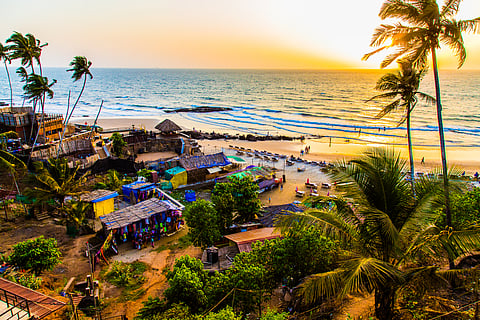
- Destinations
- Experiences
- Stay
- What's new
- Editor’s Picks
- Responsible Tourism
- CampaignsCampaigns
- Subscribe

Now, travellers marking Goa as their next holiday stop have another reason to rejoice. The state tourism department recently unveiled two innovative policies, the Caravan Policy and the Homestay Policy, in the presence of Chief Minister Pramod Sawant and State Tourism Minister Rohan A. Khauntem to promote sustainable development in line with its 'Goa Beyond Beaches' initiative.
This development encompasses various aspects such as non-vertical tourism clusters, homestay clusters, caravan tourism, agro-tourism, and spiritual tourism. The core objective of these policies is not only to offer unique experiences to tourists but also to empower local communities, thereby enhancing the overall tourism ecosystem.
With the introduction of these caravan and homestay policies, Goa's tourism industry is steering tourists away from the conventional sun, sand, and sea experiences. Instead, it encourages visitors to delve deeper into the green landscapes, rich traditions, indigenous craftsmanship, cultural diversity, and spirituality Goa offers.
"The Homestay and Caravan Policy introduced by our government aims to popularise the hinterland tourism sector by providing support and opening new avenues for growth, all of which should be availed by women entrepreneurs," said Pramod Sawant.
The Caravan and Homestay Policies share several key features. They are designed to expand the range of services available, provide fiscal and non-fiscal benefits to incentivise operators, establish a regulatory framework to ensure smooth operations, enhance service delivery standards, and guarantee top-quality services and facilities for tourists. One pivotal aspect of both policies is their focus on promoting entrepreneurship and income generation among community residents.
In terms of specific locations, the Homestay and Bed and Breakfast Policy concentrates on seven talukas (administrative regions) in Goa, namely Sattari, Dharbandora, Sanguem, Bicholim, Ponda, Quepem, and Canacona. This policy is aimed at bringing development to previously unexplored areas of the state, with a focus on agro, wellness, and spiritual experiences in the hinterland. Women play a central role in these regions, both socially and economically, and the homestays and B&Bs act as tools for harnessing their inherent talents and existing infrastructure, thereby promoting empowerment from the grassroots level.
"We understand the importance of spreading tourism revenue to areas that have been historically overlooked, and we aim to develop and promote less explored regions in Goa while at the same time preserving their unique cultural and natural heritage while creating opportunities for residents," said Rohan A Khaunte.
According to the Goa Tourism Department, these caravans and homestays will serve as workstations for professionals worldwide, allowing them to combine work with leisure. The policies offer advantages to service providers, including residential rates for water and electricity, residential property tax rates, and the reimbursement of registration fees for the first 100 homestays and B&Bs. Service providers can also receive incentives for purchasing furniture, while the Caravan Policy provides financial incentives for caravan vehicle procurement, including a substantial subsidy.
